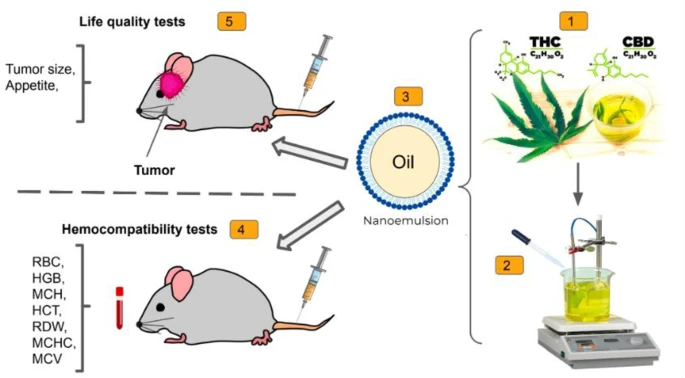A new study published in the journal BMC Pharmacology and Toxicology reveals a promising advancement in glioblastoma treatment using a nanoemulsion containing cannabis extract.
 Researchers from the University of Medical Sciences, University of Tehran, and North Khorasan University of Medical Sciences in Iran have developed a nanoemulsion designed to boost the effectiveness of two key cannabis compounds, THC and CBD, in treating this aggressive form of brain cancer. The study demonstrated that this innovative delivery method significantly reduced tumor size and extended survival in animal models, potentially offering a new therapeutic avenue for glioblastoma.
Researchers from the University of Medical Sciences, University of Tehran, and North Khorasan University of Medical Sciences in Iran have developed a nanoemulsion designed to boost the effectiveness of two key cannabis compounds, THC and CBD, in treating this aggressive form of brain cancer. The study demonstrated that this innovative delivery method significantly reduced tumor size and extended survival in animal models, potentially offering a new therapeutic avenue for glioblastoma.
The researchers aimed to enhance the delivery of ∆9-Tetrahydrocannabinol (THC) and Cannabidiol (CBD) through a nanoemulsion (NE), allowing for better absorption and effectiveness of the drugs. In their in vitro and in vivo studies, they compared the efficacy of the cannabis-loaded nanoemulsion (NED) to standard drug delivery methods and a control group using the C6 tumor model in rats.
Results showed that the rats treated with the cannabis nanoemulsion experienced a fourfold reduction in tumor size after just seven days compared to the control group. Even more notably, the survival rate of the rats treated with the NED was significantly extended. While the control group survived an average of just 9 days, and those treated with bulk drugs survived 4 days, the NED group lived for an impressive 51 days—an unprecedented improvement for such an aggressive cancer model.
In addition to the increased survival and reduced tumor size, the nanoemulsion showed excellent hemocompatibility, meaning it did not cause significant toxicity to blood cells. This is an important finding, as one of the major challenges in cancer treatment is balancing efficacy with minimizing harm to healthy cells.
The study also revealed that the NED formulation not only outperformed standard cannabis extract delivery but also avoided the high toxicity levels seen in nanoemulsions without active cannabis compounds, highlighting the potential therapeutic advantage of using cannabis-derived nanoemulsions in treating cancer.
Although these findings are based on animal models, they offer a hopeful glimpse into the future of cannabis-based treatments for glioblastoma, a cancer that currently has limited treatment options and poor prognosis in humans. The success of this study opens up new possibilities for further research and clinical trials aimed at bringing this innovative treatment closer to real-world applications.
The full text of the study can be found by clicking here.







